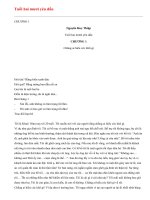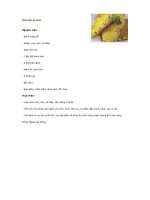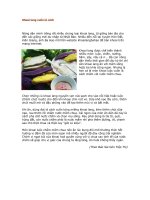Renewal Coaching Workbook docx
Bạn đang xem bản rút gọn của tài liệu. Xem và tải ngay bản đầy đủ của tài liệu tại đây (2.18 MB, 301 trang )
Renewal
Coaching
Workbook
PRAISE FOR THE RENEWAL COACHING WORKBOOK
‘‘With this comprehensive Renewal Coaching Workbook, master coaches Reeves and Allison have
wrapped practical tactics and interactive exercises with an overarching strategic approach to
sustainable personal and organizational change. Unique in its genre, this workbook is firmly
grounded on a fundamental principle—help the reader find purpose and achieve a legacy for the
greater good.’’
—Luis A. Martinez, M.Ed., author of Getting There: High Performance Strategies and Tactics
for Career Decisions
‘‘The Renewal Coaching Workbook is a wonderful resource for individuals who are going through
change, and for those helping others through difficult times. I was engrossed from the beginning.
A major strength and uniqueness is the interactive nature of being able to use the workbook as well
as the website. At a time when millions of people have to rethink their purpose, careers and lives,
this workbook provides an important tool for their development.’’
—Patricia Boverie, Ph.D., author of Transforming Work: The Five Keys to Achieving Trust,
Commitment, and Passion in the Workplace
‘‘In addition to the seven elements of Renewal Coaching (Recognition, Reality, Reciprocity,
Resilience, Resonance, Relationship, and Renewal), one could easily add ‘Realization’ in that this
companion workbook to Renewal Coaching is all about making things happen! Elle Allison and
Douglas Reeves have created a wonderful tool to help an individual, organizational leader, or lead-
ership/executive coach reach sustainable personal, professional, and organizational improvement
and success through a carefully constructed, research-based workbook that will result in a powerful
100-day action plan. This is not a book to passively sit back and read; it is a rigorous interactive
roadmap for action.’’
—William L. Coale, Ph.D., CEO, Coale Education Group
‘‘The Renewal Coaching Workbook is a wonderful piece of work. It is filled with important
information and exercises which guide the reader to discover and live from all they can be. The
book not only provides a new frame of reference through which to look at life, but the skills to do it.
This excellent book will become your personal coach to call upon whenever you like. I recommend
it highly.’’
—Brenda Shoshanna, Ph.D., author, Fearless: 7 Principles of Peace of Mind (Sterling Press,
2010)
‘‘Life is a wonderful teacher when we take time for reflection. This book provides the structure
most of us need to access learning and self-awareness in a thoughtful way.’’
—Paul Axtell, president, Contextual Program Designs, corporate and university trainer, and
consultant
Renewal
Coaching
Workbook
Douglas B. Reeves and Elle Allison
F
Copyright © 2010 by Douglas B. Reeves and Elle Allison. All rights reserved.
Published by Jossey-Bass
A Wiley Imprint
989 Market Street, San Francisco, CA 94103-1741—www.josseybass.com
No part of this publication may be reproduced, stored in a retrieval system, or transmitted in any
form or by any means, electronic, mechanical, photocopying, recording, scanning, or otherwise,
except as permitted under Section 107 or 108 of the 1976 United States Copyright Act, without
either the prior written permission of the publisher, or authorization through payment of the
appropriate per-copy fee to the Copyright Clearance Center, Inc., 222 Rosewood Drive, Danvers,
MA 01923, 978-750-8400, fax 978-646-8600, or on the Web at www.copyright.com. Requests to the
publisher for permission should be addressed to the Permissions Department, John Wiley & Sons,
Inc., 111 River Street, Hoboken, NJ 07030, 201-748-6011, fax 201-748-6008, or online at
www.wiley.com/go/permissions.
Readers should be aware that Internet Web sites offered as citations and/or sources for further
information may have changed or disappeared between the time this was written and when it is read.
Limit of Liability/Disclaimer of Warranty: While the publisher and author have used their best efforts
in preparing this book, they make no representations or warranties with respect to the accuracy or
completeness of the contents of this book and specifically disclaim any implied warranties of
merchantability or fitness for a particular purpose. No warranty may be created or extended by sales
representatives or written sales materials. The advice and strategies contained herein may not be
suitable for your situation. You should consult with a professional where appropriate. Neither the
publisher nor author shall be liable for any loss of profit or any other commercial damages,
including but not limited to special, incidental, consequential, or other damages.
Jossey-Bass books and products are available through most bookstores. To contact Jossey-Bass
directly call our Customer Care Department within the U.S. at 800-956-7739, outside the U.S. at
317-572-3986, or fax 317-572-4002.
Jossey-Bass also publishes its books in a variety of electronic formats. Some content that appears in
print may not be available in electronic books.
Library of Congress Cataloging-in-Publication Data
Reeves, Douglas B., 1953–
Renewal coaching : sustainable change for individuals and organizations / Douglas B. Reeves and
Elle Allison. — 1st ed.
p. cm.
Includes bibliographical references and index.
ISBN 978-0-470-41496-5 (cloth : alk. paper) 1. Organizational change. 2. Employees—Coaching
of. 3. Personal coaching. 4. Change (Psychology) I. Allison, Elle, 1960– II. Title.
HD58.8.R386 2009
658.3’124—dc22
2008050157
ISBN 978-0-470-41497-2 (Workbook)
Printed in the United States of America
first edition
PB Printing 10987654321
F
CONTENTS
About the Authors ix
About this Book xi
Introduction xiii
F
PART ONE PREPARATION 1
1 The Road to Renewal 3
2 Are You Ready to Change? 11
3 Finding Meaning: Connecting to Your Greater Good 19
F
PART TWO LEARNING 33
4 Pre-Assessment: Finding Your Strengths and Challenges 35
5 Interpreting Assessment Results 77
6 Your 100-Day Renewal Project 83
7 Coaching Essentials 101
F
PART THREE REFLECTION 121
8 Recognition: Finding Patterns of Toxicity and Renewal 123
9 Reality: Confronting Change Killers 137
10 Reciprocity: Coaching in Harmony 153
11 Resilience: Coaching Through Pain 163
12 Resonance: Coaching with Emotional Intelligence 181
13 Relationship: When Process Is Personal 199
14 Renewal: Energy, Meaning, and Freedom to Sustain
the Journey 217
v
Contents
F
PART FOUR SUSTAINING 235
15 Renewal Coaching in Action 237
16 Execution: Transforming Plans into Action 243
17 Measuring Your Success 259
18 Giving Back 267
References 273
Index 277
vi
F
Dedicated to the amazing and generous clients and coaches
of Renewal Coaching
F
ABOUT THE AUTHORS
D
ouglas B. Reeves is cofounder and chairman of Renewal
Coaching and author of more than twenty books and fifty
articles on leadership and organizational effectiveness. An inter-
nationally recognized expert in leadership, Reeves was twice named to the
Harvard Distinguished Authors Series and was recently named the Brock
International Laureate for his pioneering research. His work appears in
national journals, magazines, and newspapers and has been translated into
six languages. Through his affiliations with RenewalCoaching.com and the
Leadership and Learning Center, he delivers more than eighty keynote
addresses annually around the globe to audiences in North and South
America, Europe, Asia, and Australia.
Elle Allison is cofounder and president of Renewal Coaching and has
worked with clients in health care, business, education, nonprofit orga-
nizations, and government agencies. She also founded Wisdom Out, an
organization that shares the strategies used by wise people, couples,
and organizations to face whatever challenges come their way (www
.wisdomout.com). Since 2000 she has conducted countless interviews of
people who were identified as being wise by someone who knows them.
What these Wisdom Makers have to say will be published in the forth-
coming books What Wise People Do and What Wise Couples Do. She is a
member of the National Speakers Association and, through her affiliations
with Wisdom Out and RenewalCoaching.com, reaches a diverse audience
by delivering engaging and informative keynote addresses and seminars
on Renewal Coaching, wisdom, and leadership.
ix
F
ABOUT THIS BOOK
S
ince the publication of Renewal Coaching, the world has changed.
The global economy has transformed the lives of millions of
people, delaying retirements, dashing dreams, and undermining
the fundamental confidence that people have had in their ability to achieve
their hopes and dreams. If we have learned anything in this time of upheaval
it is that technology, intelligence, and analysis are not enough. The world
needs renewal and resilience.
The good news is that since the publication of Renewal Coaching,we
have heard from people in every walk of life that even in the most challenging
of times, they can make a profound difference using the tools of Renewal
Coaching. They have learned that it is both possible and necessary to bridge
the gap between idealsandreality, and that Renewal Coaching canserve as the
essential tool for transforming theory into action. Most importantly, we
have accumulated quantitative and qualitative data to support the essential
truth of Renewal Coaching. People are neither motivated nor inspired by a
4% gain in earnings, test scores, or donations, but they are resonate with
a commitment to the Greater Good. Whether the economy is depressed or
booming, people need a connection with meaning more than money.
Readers will approach this book from many different perspectives.
If you have already read Renewal Coaching and you are an experienced
coach, then jump into these exercises and prepare to accelerate your
learning. If you have not yet read Renewal Coaching, then you will find
it a useful prelude to the Workbook. If you have not yet visited the Web
site, www.RenewalCoaching.com, then you will find the assessments a
useful guide to your personal journey toward renewal. If you are new to
the coaching profession, then we particularly invite you to consider Part
Three of Renewal Coaching so that you understand both the theory and the
business philosophy supporting thecreationofa Renewal Coaching practice.
Traditional books are a one-way exercise in communication—the authors
speak and the readers listen. This book is decidedly different. The authors are
xi
Renewal Coaching Workbook
listeners and learners, and we welcome enthusiastically the participation of
readers—both professional coaches and new entrants to the profession—to
a dialogue with us. In our next book, The Renewal Coaching Fieldbook,we
will feature success stories of Renewal Coaches, and we actively solicit your
ideas, challenges, and success stories.
We wish you a renewing journey.
—Doug and Elle
xii
F
INTRODUCTION
O
ur book Renewal Coaching has already had an international
impact. We have observed coaches at many levels, from those who
are leaders of large organizations with thousands of employees to
those who are independent practitioners. We have heard from coaches in the
business, education, government, and nonprofit sectors. In the United States
and abroad, their reports are consistent: we need renewal now more than
ever, and we need practical tools to help us sustain our work. The Renewal
Coaching Workbook is the answer to those requests. In these pages you will
find interactive worksheets, assessments, and prompts to help you think,
write, react, and most important, inspire others in your journey toward the
greater good. Pick upapen or grab your laptop; thiswillnot be a passive piece
of work. The greater your engagement and the more intensive your response
to the prompts in this workbook are, the more valuable your insights will
be. Sustained change is never the result of words, however inspiring and
heartfelt they may be. Our research and practice, along with that of the many
experts we have studied, have led us to the unequivocal conclusion that
sustained change is both profoundly difficult and profoundly worthwhile.
F
THE CASE FOR SUSTAINED CHANGE
There is no dearth of information on strategy, planning, and execution.
Academicians and practitioners have published exhaustive reviews of
research and practical application on personal and organizational change.
Nevertheless, we remain far better at initiating change efforts than at
sustaining them. Although a few writers (Bossidy and Charan, 2002)
retain enthusiasm for ‘‘the initiative’’ as a change mechanism, most people
regard the announcement of change—particularly with the term initiative
included—with the bemused expression of Dilbert. Far from inspiring the
xiii
Renewal Coaching Workbook
troops to actions, most initiatives are little more than rhetorical flourishes
that represent the temporary triumph of hope over experience.
What Makes This Time Different?
When leaders announce an organization change or when individuals
write a New Year’s resolution, the missing essential question is, What will
make this attempt at change different from the past dozen that we have tried?
We have posed this question to many leaders, and their answers are sincere
but insufficient. ‘‘This time we’re going to get lots of input,’’ they say, for-
getting that surveys, focus groups, and broad-based input were used in the
past as well. ‘‘This time we’re going to have a strategic plan,’’ they enthuse,
forgetting that their bookshelves are creaking under the weight of three-ring
binders of previous strategic plans. ‘‘This time we’re going to focus on
execution,’’ they continue. The list of what makes ‘‘this time’’ different is
long on illusion and short on substance. If the focus is on strategy, planning,
and execution using the same tools and orientation of the past, then we
should not be surprised that the results are the same, with nearly all change
initiatives failing (Kotter, 2007).
The Price of Cynicism
What happens after years of failed New Year’s resolutions to diet, exercise,
visit loved ones, or get more organized? People eventually have one reso-
lution left: to stop making New Year’s resolutions. The resulting cynicism
and lethargy can occur early in life. Stanford researcher Carol Dweck (2006)
has demonstrated the profound and lasting effects of how children think
about their abilities. When they become persuaded that talent is simply a
lucky break, a gift from an unknown deity, or otherwise unfathomable, they
become unwilling to work toward a goal. Work, in their view, is not the key
to success, and their failure to work hard leads, not surprisingly, to failure.
This confirms their negative viewpoint. Similarly, adults at every stage of life
can reach alternative hypotheses that lead to hope or to cynicism. Renewal
offers a perspective that encourages the eighty-six-year-old to lead a life of
service and purpose long after people twenty years younger have concluded
that they are too old to make a contribution to society. Cynicism, on the
other hand, leads those at every stage of life into despair and hopelessness.
Organizations, too, suffer from emotional debilitation, when even vital
changes are greeted with apathy or resistance.
xiv
Introduction
The Promise of Renewal
Fortunately, Renewal Coaching offers hope for coaches and leaders at
every level and for clients in every organization. In this workbook you
will find intensive assessments that call for deep reflection and complete
authenticity. Because the coaching relationship is confidential, now is the
time for challenge, not flattery. Whatever challenges you face—and we have
observed clients with enormous organizational, physical, emotional, and
personal challenges—the path toward renewal offers a journey in which the
effort is great but the gains are greater. You will achieve these gains not by
reading this workbook but by using it. Before you proceed, either pick up a
pen or log on to www.RenewalCoaching.com and get ready for the first of
the exercises that will help you along your journey.
F
HOW TO USE THIS WORKBOOK
The Renewal Coaching Workbook is designed for four possible audiences.
First, independent coaches may use it to deepen their relationships with
clients. The coaching profession is complex and varied, including executive
coaches, life coaches, business coaches, leadership coaches, and many other
variations on the theme. Renewal Coaching is not a replacement for these
approaches but a framework that adds value to them. If you already have
a successful coaching relationship as a client or as a coach, we encourage
you to continue it and expand that relationship using the resources in
this workbook.
Second, leaders and managers within organizations can use this
workbook to improve individual and group performance. When these
resources—particularly the assessments, the coaching strategies, and the
100-Day Renewal Project—are used in the context of organizational lead-
ership, it is essential to differentiate coaching from evaluation. These
tools are emphatically not to be used for evaluating, rating, compar-
ing, or ranking employees. The purpose of renewal coaching is to create
and sustain change for the greater good. This approach helps organiza-
tions achieve their goals and assists individuals in reaching performance
objectives, but the results of these assessments are never by themselves
measurements of organizational or individual performance. If you are a
coach within an organization, your roles as evaluator and coach must be
rigorously distinct.
xv
Renewal Coaching Workbook
Third, if you are not involved in a coaching relationship but want to
engage in a process of self-assessment and reflection, this workbook will
give you a structured way to proceed.
Fourth, this workbook is the primary resource for participants in
Renewal Coaching institutes and seminars. These are conducted exclusively
by Douglas Reeves, Elle Allison, and guest Renewal Coaching faculty. To
become a licensed renewal coach or to contact a coach suitable to your
needs, visit our Web site: www.RenewalCoaching.com
F
GETTING STARTED: YOUR PERSONAL
OBJECTIVES FOR RENEWAL
In every chapter of this workbook we provide space for reflection and
guided writing. We begin with a focus on your hopes, dreams, and personal
objectives for renewal. We start by asking you to think about your successes
and challenges, and then ask you to describe a vision of where you want to
be one hundred days from now.
Think of a time in the past when you participated in a successful change either as an individual or as
part of a team. Describe the challenge, exactly what you did, and why you think it was successful.
What is your greatestchallenge right now? Even ifthis is a long-term challenge that may require months
or years of effort, it is important to focus on something that is on your mind as a serious issue at this
very moment.
xvi
Introduction
What obstacles are preventing you from addressing this challenge? Identify the people, circumstances,
resources, or other factors that are adversely affecting your ability to change.
Look at a calendar and identify the exact date one hundred days from today. Please enter that date
here:
Paint a picture in words of how that day will be different from today if you are able to begin
your renewal journey successfully. This does not mean that you will have achieved all of your goals
and dreams; but if you are on the road to renewal, describe how you will feel and act differently one
hundred days from today.
F
SLOW DOWN AND STOP BEFORE YOU
SPEED UP
You are now ready to begin, but first, stop for a moment. We know from
experience that many readers are voracious learners and tend to speed
through as many books as possible, nibbling on a few paragraphs and
lurching toward their next quick read. But the same people would never
think of listening to their favorite music at three times its regular speed
in order to be efficient, nor would they devour a gourmet meal in thirty
seconds because it was no more than fuel for their body. They would not,
if given the opportunity, go back in history and, while listening to the
xvii
Renewal Coaching Workbook
Gettysburg Address, ask President Lincoln to pick up the pace and quickly
make his point. Your quest for renewal is important. Our words may not
be as important as your favorite music or food, and they certainly don’t
match the eloquence of Lincoln’s, but your ideas, your reflections, and
your insights certainly are that important. You deserve your own complete
attention, and that requires that you slow down, think, and reflect.
xviii
F
PART ONE
Preparation
1
F
CHAPTER 1
The Road to Renewal
T
he Renewal Coaching Workbook is designed to be used by profes-
sional coaches, their clients (sometimes called ‘‘coachees’’ in the
coaching profession), and colleagues within organizations who are
seeking to create sustainable change for individuals and team members. The
book is divided into four parts: preparation, learning, reflection, and sus-
taining. Each chapter contains interactive exercises and many opportunities
for reflection. Whether you are working alone, with a coach, or in a seminar,
each interactive exercise offers valuable insights to help you achieve renewal.
At the end of this chapter, there is a special note for professional coaches. If
you are participating in a formal Renewal Coaching seminar, then you will
complete Part One before the seminar, Part Two during the seminar, and
Parts Three and Four after the seminar.
F
THE SEVEN ELEMENTS OF RENEWAL
COACHING
Your journey toward renewal consists of seven elements:
Recognition—Finding patterns of toxicity and renewal
Reality—Confronting change killers in work and life
Reciprocity—Coaching in harmony
Resilience—Coaching through pain
Resonance—Coaching with emotional intelligence
3
Renewal Coaching Workbook
Relationship—Nurturing the personal elements of coaching
Renewal—Creating energy, meaning, and freedom to sustain the
journey
For each element of the Renewal Coaching framework you will find
assessments to explore your strengths and challenges in each area. Through-
out the workbook you will be guided on different paths of reflection that will
vary according to your responses to the assessments. Therefore, completing
the assessments will be essential for this workbook to be productive for you.
F
WHY CHANGE FAILS
You already know a great deal about why change fails and succeeds. Think
about change efforts that have failed at work or in other organizations in
which you have been involved. Consider personal change efforts you have
begun with sincerity but, for one reason or another, in which you did not see
the results you hoped to achieve. List at least five of these change efforts in the
following table along with a few words about why the change effort failed.
Change Effort Why Change Failed
4
The Road to Renewal
Now review the changes you listed. What are the common elements of
the failure of change based on your own experience?
When we have asked this question of people in seminars around the
world, the results have been astonishingly consistent, crossing cultural,
economic, and occupational boundaries. Commonly mentioned causes for
failure include the following:
‘‘Too much too soon’’
‘‘Inadequate buy-in from people who actually had to implement the
change’’
‘‘Big fanfare followed by no support or implementation’’
‘‘Top-down directives without explanation, listening, or empathy’’
‘‘Failure to consider the emotional losses associated with change’’
These comments are the tip of a very large iceberg of regret and dissat-
isfaction when people are given the opportunity to discuss why change has
failed. Now consider the other side of the equation. Think about change
efforts you have seen at work or other organizations that have succeeded.
Consider personal change efforts where you saw results over a sustained
period of time. List at least five of these change efforts in the following table
along with a few words about why each change effort succeeded.
Change Effort Why Change Succeeded
(continued)
5









